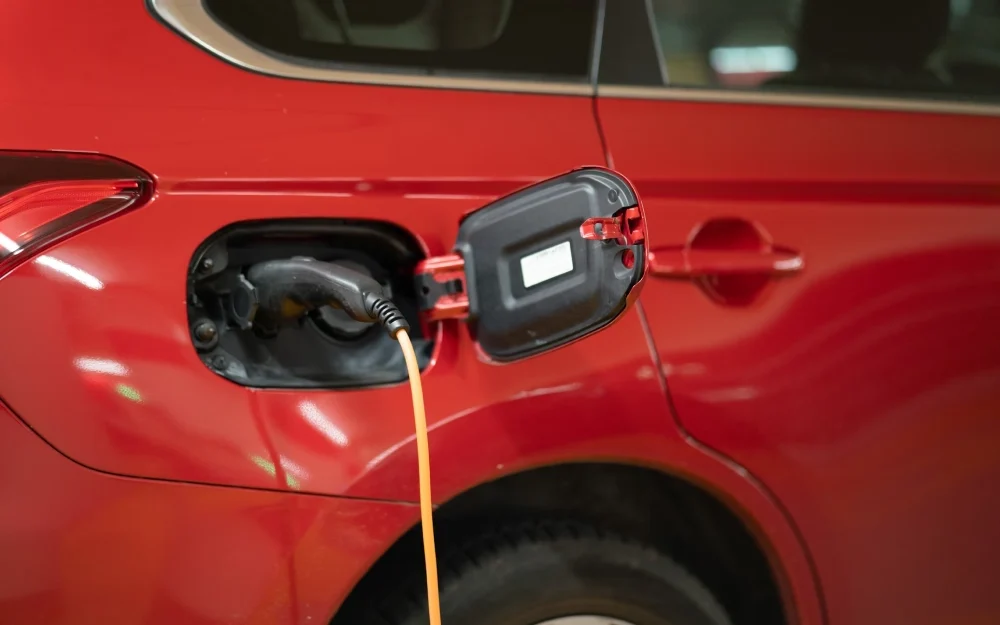Does Texas Have State Income Tax? Overview of Texas Taxes
4 minute readLearn how Texas’s unique tax structure—without state income tax but with higher property and sales taxes—impacts residents, renters, and businesses in 2025.
Home > Blog > How Much Does It Cost to Charge an Electric Car in Texas?
5 minute read • Last update April 2025

Electric vehicles (EVs) are surging in popularity, so much so that the International Energy Agency estimates nearly one in every five cars sold is now electric.
The benefits for EV owners are fairly obvious — no more pricey gas station bills, lower maintenance, better performance, and a significantly reduced carbon footprint. However, in areas like Texas, where electricity costs can be volatile, the cost to charge an electric car can be harder to estimate than elsewhere.
Thinking about investing in an electric vehicle? Here’s a rundown of everything you need to know, including public EV charging costs, charging station installation details, and some practical guidance on how to calculate the cost of charging an electric car at home.
What does it cost to charge an electric vehicle in Texas? Well, the answer is that it depends on your location, your vehicle, and several other factors.
According to StableAuto, the average cost to charge a car in Texas is $0.50 per kWh. Although there seems to be a wide range of prices across the state. For example, in Austin, Texas, you can charge your car for $0.09 per kWh, or between $0.01 and $0.21 per minute (depending on the type of charger you plug into).
You could also sign up for monthly EV charging plans through companies like EVgo instead of paying per kWh. For example, you could pay $6.99 per month for 3-5 charging sessions.
Let’s add some more context. According to JD Power, 75-100 kWh are required to fully charge an electric vehicle. Using StableAuto’s average cost, you would pay between $37.50 and $50 to charge your vehicle.
In Austin, it would be much cheaper. At $0.09 per kWh, you would pay between $6.75 and $9 to fully recharge your vehicle.
There’s no black-and-white answer as several factors influence the cost of electric car charging. Let’s take a quick look at the primary considerations:
Calculating the average price per charge is relatively straightforward for EV drivers using public charging. It’s simply a case of adding up each one-time expense and dividing the total by the number of times you charged over a given timeframe.
Calculating the average cost of electric car charging at home is a little more complex, but it is possible. First, calculate your cost per kWh by dividing the total dollar amount of your electric bill by the number of kilowatt-hours used. Given that the typical driving range of an EV is about 3 miles per kWh, you should then divide the total number of miles driven in a month by 3 to find the kWh used for driving. Multiply this by your cost per kWh to find the total cost of charging at home.
The overall average price per charge will vary based on your geographical location, as electricity rates vary widely. This means EV drivers in states with higher electricity rates will generally pay more per charge, regardless of whether they use home charging equipment or a public charging station.
The short answer is anywhere between 30 minutes and about 20 hours, depending on vehicle type, battery and circuit capacity, and charger configuration. That said, here’s a general guideline:
While it depends on the vehicle size, the battery size, or fuel tank capacity, and the cost of resources where you’re charging, charging an electric vehicle can certainly be cheaper than paying to fill a gas tank.
As of April 17, 2024, the average cost per gallon of gas in Texas is $3.23, according to AAA. A typical gas tank may hold 15 gallons of gas. To fill that tank would require $48.45.
Pulling our total EV charging costs from earlier in the article of $6.75 to $50, you may expect to spend less per charge compared to filling a tank of gas.
Before purchasing an EV, it’s essential to weigh up the pros and cons thoroughly and assess the cost to charge an electric car compared to paying regular fuel prices. Here’s a quick breakdown of the key factors to consider.
The unit price of home charging stations varies based on battery type, which determines how much power is output and how quickly you reach full charge. There will likely be a few associated expenses to account for, too, including professional installation fees and the cost of any local authority EV charger permits. However, some homeowners may be eligible for electric vehicle charging incentives, which can significantly reduce the upfront cost.
Because your electricity bill is calculated using residential rather than commercial rates, charging an electric car will generally always be cheaper at home. Plus, it’s way more convenient as you have complete control over how much to charge an electric car at home. For example, you can use a Level 2 charger to quickly add range to your vehicle during a lunch break or alternatively charge overnight using either Level 1 or Level 2 charging, taking advantage of off-peak electricity rates for minimal cost and effort.
While the convenience of home charging is hard to beat, public charging networks provide essential solutions for on-the-go top-ups and long-distance travel. Most EV charging networks require users to subscribe to memberships or incur pay-per-use fees, although there are free chargers available at over 600 stations in Texas. In either case, the availability of charging stations along your frequently traveled routes should always be a consideration.
Once you’ve selected a solution that meets your needs based on charging speed, vehicle compatibility, additional features, and budget, it’s time to decide on installation and long-term use. Here’s a quick step-by-step on how to get started:
As you can see, the cost to charge an electric car can vary considerably, making access to straightforward energy plans a primary consideration for EV owners.
At BKVE, we specialize in helping Texans find the most affordable energy plans for their homes. Our services are transparent and jargon-free, with no monthly base charges or minimum usage requirements. Additionally, we offer Spark Alerts that provide energy-saving tips to help you navigate around peak charges, weather alerts, and more.
Enter your zip code to explore rates in your area.
Graham Lumley, Digital Marketing Manager at BKV Energy, leads digital and traditional marketing strategies, focusing on educating Texans about the state's deregulated energy market. With over 8 years of marketing experience, he creates content to help consumers understand and save on their energy bills, bringing a fresh and dynamic approach to the industry.

Learn how Texas’s unique tax structure—without state income tax but with higher property and sales taxes—impacts residents, renters, and businesses in 2025.

Learn how to navigate Texas’s diverse job market based on your role, location, and job search strategy.
Get $50 off your electric bill!
Use code BKVEJOINUS50
Enter your zip code to shop BKV Energy's affordable, fixed-rate Texas electricity plans. Use the promo code for $50 off your electric bill.